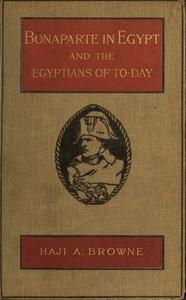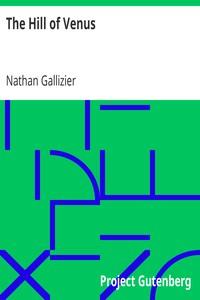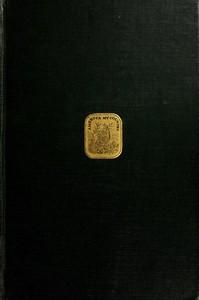|
|
Read this ebook for free! No credit card needed, absolutely nothing to pay.Words: 85402 in 15 pages
This is an ebook sharing website. You can read the uploaded ebooks for free here. No credit cards needed, nothing to pay. If you want to own a digital copy of the ebook, or want to read offline with your favorite ebook-reader, then you can choose to buy and download the ebook.

: Bonaparte in Egypt and the Egyptians of To-day by Browne Abdullah - Egypt History French occupation 1798-1801; Napoleon I Emperor of the French 1769-1821 Relations with Egyptians; Second Coalition War of the 1798-1801 Campaigns Egypt; Egypt History British@FreeBooksWed 07 Jun, 2023 ny of them would have honestly laboured to amend could they but have found a way to do so. Thus all the conditions and circumstances in the three countries tended in different directions--in one, to move the people to peaceful action; in another, to drive them to destructive wrath; and in the third, to lead them to patient submission. For the Englishman and the French, then, there were ways to progress--ways encumbered with difficulties and dangers, but with something more than a mere possibility of success to draw them onward--while the Egyptian was on all sides hemmed in by the impossible. Nor have we yet seen all the causes that have helped to determine the present character of the English and that of the Egyptians. Then, as now, the Mahomedan peoples were taught by the Ulema, as were, and are, the people of England by the Church Catechism, that it is their bounden duty to submit themselves to all their governors, teachers, spiritual pastors and masters, and to order themselves lowly and reverently to all their betters. But the reception accorded to this teaching by the two peoples was, and is, vastly different, and that it was and is so is mainly due to the conditions under which they are placed. The blood of the English is largely tinged with that of the restless, adventurous peoples whose early invasions of their island fill so many pages of its early history, and by descent, the influence of climate, and the whole course of their history they have become possessed of a spirit of independence, energy, and self-reliance that instinctively leads them to a broad and healthy interpretation of this doctrine. But this spirit was altogether foreign and unknown to the Egyptian, and that it should be so was an almost inevitable result of the peculiar conditions affecting their country as contrasted with those prevailing in England. Thus in our sea-girt home, with its uncertain weather, the success of the farmer's labours was always in a great measure dependent upon his own skill and energy. Through all the changes of the seasons of the year each day brought to him its round of duties to be performed, duties exacting not only toilsome labour, but thoughtful care and wise foresight in adjusting that labour to the ever-varying conditions he had to meet. It was not so in Egypt. There the measure of the farmer's success was mainly the result of the operations of Nature, for the richness or poverty of his harvest was proportioned, not to his efforts, but to the abundance or scarcity of the inundation of the Nile. With a bountiful flood he had little to think of but the purely routine labours of his fields; with a scanty stream no labour, no energy of his could save him from the disaster of an impoverished harvest. In England, therefore, where constant foresight, thought, and well-arranged labour were needed to win subsistence from an ungenerous soil, the farmer learned to think and act for himself, whereas in Egypt, where he was at the mercy of the Nile, he drifted on from day to day undisturbed by aught but the mere mechanically performed labour of the fields. In both countries the bent thus given to the minds of the agricultural classes with respect to their daily labour naturally affected their manner of regarding other matters. Thus the Englishman brought to all matters that he had to deal with at least something of the care and thought he gave to his daily work, and weighed and balanced probabilities and possibilities in his political and social affairs just as he did in the choosing of a crop, while the Egyptian left almost all things to shape their own course, even as he of necessity accepted his harvest as it came. The character which the agricultural classes in the two countries thus acquired reacted upon the people generally, for it is the character of the great mass of the people that in general finally decides the character and fate of a nation. And other causes contributed to increase the difference in the character of the two peoples. In England taxation was excessive and crushing in its effects upon all but the wealthy, but it was systematic and did not prohibit or prevent the accumulation of wealth, whereas in Egypt, while the nominal taxation was lighter it was in effect far worse, and the more so that its arbitrary assessment and irregular collection, coupled with the atrocious tyranny and cruelty by which these were accompanied, and the oft-recurring infliction of illegal taxes and impositions, effectually deprived the people of all opportunity of, or desire for, improving their position. In England, too, labour of some kind was indispensable. Life was a constant struggle, and he who did not work was ever in imminent danger of starving. It was quite otherwise in Egypt. The grinding, hopeless poverty that not only then but still exists, though happily we may hope in an ever-lessening degree in England, was and is unknown in the East. There so few and simple are the needs of the poor that the humblest can always afford to share the little he has, and the absolute destitution, but too common in England, is there practically impossible. Moreover, the Englishman, though enjoying the benefit of a temperate climate, if he would not perish from inanition from the inclemency of its winter, was compelled to find by some means or other food of a more nourishing and stimulating quality than that which the Egyptian needed. He had also to provide himself with an amount of clothing and artificial warmth which the genial though enervating air of his native land rendered altogether unnecessary to the Egyptian. Of necessity, therefore, the Englishman's needs stirred him to an activity and energy to which the conditions of life in Egypt supplied no inducement. Lastly, the Englishman who could acquire wealth was assured of the peaceful enjoyment of it, whereas the Egyptian knew but too well that the merest rumour of his possessing aught more than the bare necessaries of life could but subject him to tyranny and torture, until he had surrendered his last coin or seizable pennyworth of value. From this diversity in the conditions and circumstances of the two people, we can see why to the one the instruction to be content with that state of life in which he found himself was as unpalatable as to the other, it was a mere summing-up of the whole philosophy of life. However hard the condition of the Englishman's lot might be he could always look to improve it; in fact for him the one hope of happiness lay in the possibility of bettering his condition, while that of the Egyptian lay in passive submission to the chains that bound him. That, of the two people, the Egyptian was in some respects, for the time, the happiest is at least possible. Like the Englishman, the Egyptian prizes more than all else his individual freedom: the mere liberty to come and go, to work or idle as the impulse of the moment dictates, and detests constraint and compulsion of every kind. This freedom he enjoyed with no other bar than the recurring fear of the tax-collector, the Corv?e, or the Korbag, to which he was liable. These, however, were evils that afflicted him only at intervals, and the Corv?e, one that he always hopefully looked to escape from, while as to the Korbag, the long strip of hippopotamus hide, which was the common instrument of punishment and extortion, ever in the hands of his oppressors, though too often used with the murderous brutality to which the negro slaves of America were then and long after subject, this would seem in general to have been to the fellaheen not much more terrible than was the cane of a flogging master to the boys of an English Dotheboys School of the time. Hence his personal wants being too few and too easily supplied to give him any serious thought, the Egyptian sauntered through life on the whole contentedly enough, while the Englishman was ever ceaselessly engaged in a struggle for the bare necessaries of life; and it was as natural, therefore, for the Egyptian to accept with passive acquiescence the submission taught him by his guides, as it was inevitable that the Englishman should criticise or ignore that preached to him. Thus it was the circumstances of their lives, and not, as has so often been said, their religion, or their "fatalism," that caused the Egyptians to lack so absolutely the energy and self-reliance so dominant in the character of the Englishman, and this lack that rendered them so incapable of self-government. That this is a correct deduction from the facts, we may see by comparing the Egyptian Moslems with the Copts, for these are of the same race, inhabit the same country, and are subject to most of the conditions of life affecting the Moslem Egyptians, and yet are essentially different from them in character and aptitude. So great and so marked is this difference that it is referred to and commented upon by every one who has undertaken to write of Egypt and its peoples, although, apparently incapable of discovering the true origin of the contrast, those who have discussed it have either dismissed it as a problem admittedly beyond their comprehension, or have claimed that the Copt's superiority in intelligence and energy is the product of his religion. But save in matters of doctrine and dogma the religious teaching that the Copt receives is almost exactly the same as that given to the Egyptian Moslem, with this important difference, namely, that the Copts have always considered that obedience given to a non-Christian Government is but a duty of expediency, one exacted by force and not by right, and binding upon them only so far as submission is essential to their self-preservation. It was a matter of life and death to the Copt that he should court the forbearance and favour of his superiors. That he should do this he was bound to acquire all that he could of wealth and influence, and his relations with the rulers of the country as an indispensable servant enabled him to do this in a manner, and to an extent, wholly impossible to his Moslem countrymen. Thus political conditions acted upon the Copt as climate and social conditions upon the Englishman, forcing him to bestir himself with energy on his own behalf, to cultivate and exercise his natural ingenuity, and trust solely in his own ability. The comparatively easy-going life of the peasant was not for him, inasmuch as he was not permitted to own land, and therefore, like the Englishman, he must either work or starve. And in doing this he had not only to compete against his fellows, but to make his way against the open hostility of the governing classes and of the people generally. Hence it is not to his religion but to the circumstances surrounding his profession of that religion that the Copt is indebted for both the good and bad characteristics by which he is distinguished, for it was these that gave him the energy, intelligence, and self-reliance he undoubtedly possesses, while at the same time they too often rendered him servile, false, bigoted, and fanatical. It should now be clear that it is neither the "fatalism" nor the religion of the Egyptian Moslem that unfits him to govern his country. If any further evidence be wanted to justify this conclusion it is to be found in the Mamaluks and the Jews. The former, although they were Mahomedans, were by race, training, and all the circumstances of their lives, exactly opposed to the Egyptian Moslems in all their characteristics; their restless activity was strenuously employed in promoting their own interests, and in the acquisition of wealth, and in seeking these they were recklessly indifferent to the baseness of the treacheries and brutal tyranny that served their ends, and yet their religion and fatalism were the same as those of the Egyptians. As to the Jews, these were a people suffering graver political and social disabilities than those that burthened the Copts, and wholly foreign to the Egyptian Moslem or Copt in race, habits, and aptitudes; yet under the same conditions we see them developing, not in Egypt only, but in all parts of the world, the same qualities as those of the Copts and developing them in greater or less degree, precisely as the exigencies of their surroundings control them. And as the inhabitants of towns and cities in which the struggle for existence is always keener than it is in rural districts are invariably intellectually superior to the people of those districts, so it was in Cairo, the Moslem traders and artisans, who formed the bulk of the population there, approaching the Copts in the intelligence and energy so lacking in those employed in the cultivation of the land. I have now, I hope, shown with sufficient clearness and detail how the character and actions of the Egyptians in 1798 corresponded to the circumstances of their lives. We have been told that men should rise above their surroundings, but as I have already said, the very existence of the Egyptian depended upon his submission. The swimmer, caught in the fierce rush of a cataract, has no hope of safety but in submitting to the current and devoting all his energies to guarding himself from the rocks and eddies that are the most pressing of the dangers of his position. Such was the case with the Egyptian. To have struggled against the stream would but have been to waste his strength in futile and fatal effort, and although it was probably unconsciously that he did so, he acted in the only way to ensure the continuance of his own existence. THE GATHERING OF A STORM Cairo in 1798 as a city wherein to wander was much safer for the wanderer than was London in that year of grace. It had no Alsatia, such as Whitefriars had been in the days of Nigel, nor "Holy Land," such as the Seven Dials was down almost to our own day. It had no criminal class, and its mendicants were then as now few, and almost all strangers from elsewhere. The peaceful citizen or stranger could walk through any part of the town by day or night free from the dangers he would even to-day encounter if he ventured through some of the slums of the "World's Metropolis." Cairo is to-day unchanged from what it was in this respect save in the infamous quarter of the town devoted to the nightly carnival of vice that European civilisation demands, and, under the august protection of Consuls-General and all the pomp and glory of diplomatic dignity, obtains. Volney has drawn a sufficiently deplorable picture of the visible poverty of the Cairenes as he saw them in 1783, but it is highly probable that this glaring poverty was to a large extent of the same self-flaunting type so common in India, where certain sufficiently well-to-do classes of the people seem by their outward showing to know no mean between ostentatious prodigality and a pretence of poverty. But there was then in Cairo a class that gained its uncertain meals from still more uncertain employment, or from the hospitality or charity that in the East so seldom fails. There were, too, some waifs and wastrels, as there will always be in all great cities and towns until civilisation shall have passed its present hobbledehoy-hood. These two classes suffered much from the total suspension of business in the town, and rendered desperate by the complete failure of all their ordinary means of livelihood, and emboldened by the absence of all authority resulting from the flight of the Mamaluks and almost all the officials and leading men of the town, broke out in lawless disorder, and, joined by many of those whom the panic-stampede had reduced to poverty, began pillaging the deserted houses and mansions of all that was left in them. Bonaparte being informed of this, at once sent parties of soldiers into the town with the double object of suppressing outrage and robbery and of seizing everything of value that the Mamaluks and other fugitives had been forced by the haste of their departure to leave behind them. Proclamation was also made that whatever had been taken by any person from any of the deserted houses should at once be surrendered to the French, and, as a warning to those who might be inclined to disobey this command, several men who were caught either in the act of stealing or in the possession of stolen property were summarily executed. Not content with these measures for the recovery and protection of what he no doubt regarded as his lawful booty, Bonaparte is said to have countenanced, if he did not actually order, the infliction of torture with a view to forcing the disclosure of hidden wealth. Free books android app tbrJar TBR JAR Read Free books online gutenberg More posts by @FreeBooks
: The Hill of Venus by Gallizier Nathan Garrett Edmund H Edmund Henry Illustrator Verburg P Illustrator - Italy History 13th century Fiction@FreeBooksWed 07 Jun, 2023

: A Civic Biology Presented in Problems by Hunter George W George William - Biology; Sanitation@FreeBooksWed 07 Jun, 2023
|
Terms of Use Stock Market News! © gutenberg.org.in2025 All Rights reserved.






